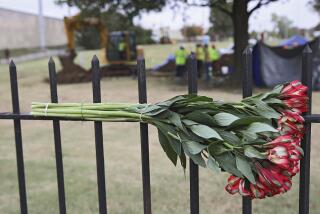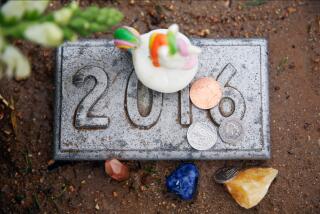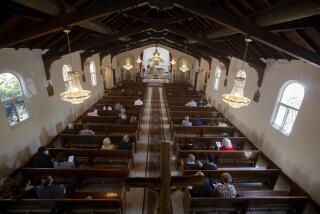Lynwood mortuary director is skilled in the quiet rites of death
The grandfather clock in the vestibule of the Douglass Family Mortuary in Lynwood is silent. The key misplaced, the mainspring unwound, its hands lie motionless at 6:38. Martha Castañeda has long stopped listening for it.
In the company of the dead, she is happy to lose track of time just as she has this Saturday morning standing beside Juan Antonio Reyes Villatoro, who lies in the ivory crepe of his silver-finished casket.
She studies his face, the pursed lips and the trimmed goatee. She is the manager of the mortuary and knows little about this man, a truck driver who was 45, who came home one day from work complaining of chest pains and seven days later died in the hospital.
His countenance says nothing about him. Was he kind? Was he loving? That judgment lies with his family, who will soon fill the chapel and find in his empty expression a reminder of their own mortality.
He looks good, she thinks, in his brown suit, matching tie and pocket square. She smoothes his lapel and adjusts his cuffs, and with a fine-tipped paint brush, adds color to his lips.
There are many ways to die — by homicide, by suicide, accident or natural causes, after a lingering illness or a sudden collapse — and Castañeda, 53, has witnessed the sorrow that follows each. She associates death with suffering and does whatever she can to hide its signature: the evidence of an injury or a medical procedure. Sometimes she just needs to erase its pallor.
When she notices the pale bands where Villatoro wore his rings, she reaches for the makeup to even out the coloring.
She has worked for the Douglass family for 25 years, and by her estimate has helped arrange more than 5,000 funerals. She is often the first to arrive in the morning, swinging open the iron gate and unlocking the oak doors to this peach-colored building.
Most people try not to think about death, but Martha lives with it every day. When friends ask about her work, she often tears up, recounting the emotions of a job that brings her so quickly into the lives of families when they are most vulnerable.
Beyond the frosted windows, cars and trucks on Imperial Highway breeze by. The world is beginning to stir, and in the chapel, the morning sunlight sifts through the stained-glass windows, diamonds of purple, emerald and golden light fanning across the pews.
She didn’t know what she was in for when she got started in this business in 1986. She was 28, a single mom with two little girls. She needed a job, and Sam Douglass gave her a chance. His family started the business in the late 1920s, and as a boy growing up in the South Bay, Douglass grew accustomed to dinner table conversations about the latest caskets and cremation.
Castañeda was asked to type, file and answer the phone in the Hawthorne office.
At first she was unaware of what the business did. Born in Tijuana, she had come to this country as a child, learning English in school and on television, and was unfamiliar with the word “mortuary.” Its closest equivalent in Spanish is funeraria.
Besides, her desk was away from the chapel and the embalming room. The day she found out, two weeks after starting, she panicked. She had been filling in for the manager in Paramount. A driver asked if he could bring in the cases, and she said yes, not knowing what he meant. When she found herself alone with two dead bodies, she called her mother, who told her to stay put.
She tried not to think about the movies she had watched with her brother — “The Exorcist,” “The Night of the Living Dead” — and she tried not to imagine a terrible end for herself.
In time, she got over her fear and lived for a number of years in the apartment above the Lynwood mortuary. Her youngest daughter played soccer on the front lawn and needed to be reminded to be quiet when there were guests.
Today Douglass Family Mortuaries owns four funeral homes and a company in Garden Grove that arranges cremations. Douglass’ youngest son, Sean, 42, oversees the operations. Sam Douglass, 80, is semi-retired.
Castañeda starts working on the program for Villatoro’s funeral, pairing the 23rd Psalm with his photo. The plaintive notes of Eric Satie’s “Gymnopédie No. 1” play in the background. Around her computer monitor, she keeps pictures of her children and grandchildren, nephews and nieces. In one corner of the credenza behind her, she keeps pictures of her deceased mother, her brother and two nephews. The dead, she jokes, have her back.
::
In an ancient era, the god Mercury was thought to escort souls to the underworld, and faithful today believe that Christ rose to show a world beyond the tomb. In a practical, secular way, Castañeda attends to the departed, treating them with maternal regard and helping families with the cumbersome bureaucracies of city and state, the paperwork, permissions and announcements.
Castañeda knows this work is her calling. Un don, she says, a gift, an ability to care for the living and the dead. She credits her first boss, Jess Angon, for teaching her the most basic sensibilities in the business: Treat each family as your own and don’t be afraid.
When she started working in Lynwood, she recalled, Angon used to joke with her.
“C’mon,” he would say. “I’ll take you in the back.” That’s where the bodies were kept, and the smell of formaldehyde was pervasive.
“No, no, no,” she insisted.
Angon was like a father, and on the day that he died in October 1987, she hurried into the back room, where she found him, held his lifeless hand and wept. She found the strength to arrange his funeral, dressing him in a black suit, pink shirt and black tie and setting him into a black casket with a silver crepe interior.
She believes there is value in this ritual — making preparations for the dead — and when she speaks to families in the arrangement room, discussing the logistics, she tries to slow down these moments and allow their memories to filter through their bewilderment to create a picture of the deceased: favorite color, personal saint, a hobby, a moment in their life that best captures their character.
Death and funerals are fleeting moments. At her mother’s interment, Castañeda remembers walking away from the gravesite, hearing the backhoe start up and feeling the machinery compress the soil around the vault. When she looked back, the grass was in place and the flowers were gone, as if nothing had ever happened.
But loss lingers. When families ask her whether they will recover from their grief, she answers as best she can: Only time will tell.
Villatoro’s sister and her husband arrive, and Castañeda shows them into the chapel. Maria Maldonado reaches out for her brother.
“No lo toque,” Edgar Maldonado says. Do not touch him.
Castañeda overhears.
It’s all right, she says in Spanish, he has just a little makeup on his hands.
“Juanito,” Maria keens. “Juanito.”
Edgar holds his wife.
::
Castañeda often stands beside her families near the open casket. She is pragmatic about the past: What happiness was there, was there. What anger was there, was there. What apologies were said, were said. Now is the time to discover what remains in their absence.
Death, she says, is not the time to second-guess how we treat one another or voice regret. The dead can offer neither absolution nor forgiveness. She remembers the brother who didn’t give his sister a ride home one night, and after she was found slain, he stood over her casket and cried for what might have been.
The Maldonado family begins making coffee in the break room and laying out sandwich trays and the ollas tamaleras, steamers for the chicken tamales. More friends and relatives arrive, and as they spill over into the patio and into the hallway, the gathering becomes a reunion.
After lunch, the family and friends convene in the chapel. A pastor steps to the lectern. His voice carries over speakers throughout the funeral home.
“Nuestros días aquí en la tierra son cortos.”
Our time here on Earth is short, he says. We run out of days, and it is something we have to recognize and accept.
Sitting in her office, overhearing these services, Castañeda often gets goose bumps. Sometimes she cries. The voices in the chapel have more conviction than those she hears Sundays in church, and she believes the families are trying to open the gates of heaven with their prayers and testimony.
If there is moralizing or judgment, she tunes out the words and shakes her head. This isn’t the time to preach right or wrong, she says; this is the moment to provide solace and try to answer the most basic questions of life.
What is death? Death, she has learned, is the loss of the body.
What is grief? Grief, she has discovered, is the love the dead inspire.
What is the soul? The soul, she believes, is the feeling left in others.
When her life is over, she will be ready. She has already selected a nice home, as she calls it, a Paragon Mahogany by Batesville, a traditional wood casket with an eggshell velvet interior.
The chapel swells with singing, and the singing turns to crying. Another pastor speaks.
“Así es que, hermanos, yo sé que hay tristeza.” So, brethren, I know there is sadness, he says.
“We’re not going to try to ignore what is obvious,” he continues. “If we’re going to feel sad, then let’s be sad because that is where our souls lie — in the life that remains in our hearts.”
The funeral over, Castañeda thanks her guests and opens the doors to the parking lot. Family and friends drift into the afternoon light. She blows out the candles and closes the casket. In a few days, Villatoro will be flown to his family home in El Salvador, where his mother will say her last goodbye.
More to Read
Start your day right
Sign up for Essential California for news, features and recommendations from the L.A. Times and beyond in your inbox six days a week.
You may occasionally receive promotional content from the Los Angeles Times.







